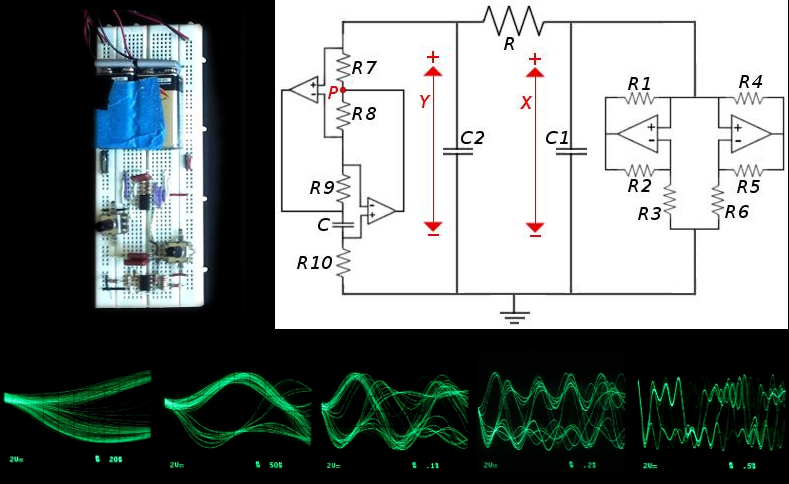Chua’s circuit is the simplest electronic circuit that produces chaos—the output of this circuit never repeats the same sequence, and is a truly random signal. If you need a good source of randomness, Chua’s circuit is easy to make and is built around standard components that you might have lying around. [Valentine] wrote a comprehensive guide which walks you through the process of building your own source of chaos.
The chaos of Chua’s circuit is derived from several elements, most importantly a nonlinear negative resistor. Unfortunately for us, this type of resistor doesn’t exist in a discrete form, so we have to model it with several other components. This resistor, also known as Chua’s diode, can be created with an op-amp configured as a negative impedance converter and a couple pairs of diodes and resistors. Other variations such, as the schematic above,22`01 model Chua’s diode using only op-amps and resistors.
The rest of the circuit is quite simple: only two capacitors, an inductor, and a resistor are needed. [Valentine] does note that the circuit is quite sensitive, so you might encounter issues when building it on a breadboard. The circuit is very sensitive to vibration (especially on a breadboard), and good solder connections are essential to a reliable circuit. Be sure to check out the Wikipedia article on Chua’s circuit for a brief overview of the circuit’s functionality and a rabbit trail of information on chaos theory.
















Could I need this for a true Random Number Generator (RNG)?
You could, but it is a finicky circuit, and even if you can get it to work reliably, it’s still not a source of white noise.
You’d most likely be better off using a traditional avalanche noise generator.
no, chaos isn’t randomness. the lorenz quote on wikipedia describes it nicely: chaos is “When the present determines the future, but the approximate present does not approximately determine the future.” for a random number generator, you want the “future” to be independent of the “present”
A chaotic system by itself isn’t random, but it does amplify various random events from the environment, which could make it useful as part of a random generator.
alert(“X”)
<script>alert(“X”)</script>
Indeed!
:)
“…and is a truly random signal.”
Chaotic behavior is not the same as randomness in the sense that it does not have a probability density function like gaussian. To generate random signals, it is preferred to use a white noise source such as a resistor than a chaotic circuit.
Chaos is affected by “butterfly effect” which says that a very small change in initial conditions will have big repercussions later. A butterfly flapping its wings in one part of the globe might cause rain in some other part of the globe.
Refer the wonderful book ‘Chaos — James Gleick’
Here is a video on Chaos by Rudy Rucker which he tweeted:
“James Gleick’s CHAOS” software demo movie is online. Half hour video, me talking & demoing.
https://www.youtube.com/watch?v=ICrNOTQBS8U
“A butterfly flapping its wings in one part of the globe might cause rain in some other part of the globe.”
I hate that notion. It’s not that the butterfly effect causes the rain. It steers the rain, so that it falls down three meters from where it would have otherwise ended up. On the large scale, the effect of a single butterfly will drown completely in other noise sources even in chaotic systems, unless the system is perfectly deterministic from its starting conditions.
There’s many more butterflies along the way.
There is necessary and sufficient reason to act as if hard determinism is the correct theory. Given that, many, many things are not just possible, but as a matter-of-fact. We merely lack the understanding and computational ability for prediction. Even if we did, it would not make one bit of difference.
“As with any circuit, building this on a breadboard will be faster but not as accurate as soldering your own board. Because this is a resonating chaotic circuit, solid connections are essential to producing sharp, accurate signals.”
Uh. Sharp, accurate… chaos? These words don’t seem to belong together. ;)
The scope traces posted here look very much like some I got two days ago. They came from a switching power supply with a cracked solder joint, that reduced the output capacitance below stable limits.
Chaos != randomness. In the technical sense of the word, chaos describes the behavior of a system that is extremely sensitive to initial conditions, but it says nothing about randomness. Over long enough time scales this sort of behavior can appear random, but in nearly all cases chaotic systems are not random. Taking the weather as a common example of a chaotic system, note that the weather three months from now is very hard to predict, but it’s quite easy to predict the weather a few days, hours or minutes from now. If weather systems were random, we wouldn’t be able to accurately predict the weather a second from now.
The distinction between randomness and chaos is very important, especially in an article that purports to have something to do with chaos theory.
As long as the system is sensitive to variations in initial conditions that are too small to know, the output will have a random component.
Incorrect. Not knowing the initial conditions does not make the output random, because IF you knew them, you would still be able to compute the outcome. Since you don’t know, or can’t know the input, the output merely appears random. It becomes truly random only if the initial conditions are random, or the process itself contains random steps.
First of all, there’s a theoretical limit to knowing the initial conditions according to Heisenberg. Secondly, the distinction between “appears random” and “truly random” is rather academic. The numbers only a roulette wheel only appear random, but that’s still good enough for Las Vegas.
Your first and last statement contradict. A roulette wheel is a chaotic system, and so if we trace the cause of the outcome all the way down to the atomic level, you run into the uncertainty principle and, according to the Copenhagen interpretation of QM, your roulette wheel will be actually random and not just appear so.
And it’s not an academic consideration. Is random and appears random is important in cryptography, because what appears random depends on how carefully you look.
The roulette wheel only runs for a short time, so there’s a good chance that quantum events don’t have enough time to propagate to a macro scale event that would change the slot that the ball lands in. The roulette game simply based on the fact that the gambler doesn’t have precise enough knowledge of the initial conditions.
Similarly, cryptography is a practical field, based around hiding information from adversaries. Data that just appears random because the adversary didn’t have knowledge of the initial conditions is good enough, even if the initial conditions are knowable in theory. As long as finding out the initial conditions is harder than finding out the result (such as a secret key), there’s no problem.
There’s two types of chaos, deterministic and non-deterministic chaos which includes varying degrees of randomness. The weather system is non-deterministic chaos whereas a computer simulation of the Chua’s circuit is deterministic chaos. A physical implementation of the circuit is again non-deterministic insofar as reality is, because it is influenced by stochastic elements like sound waves travelling in the room.
A computer simulation of the Chua’s circuit is deterministic, because the simulation is deterministic. Similarly, a simulation of a weather system is deterministic. A real, analog, Chua’s circuit is non-deterministic.
That’s what I just said.
How does not being able to accurately measure all the starting conditions of something deterministic, suddenly make it non-deterministic?
By that logic
X + 2 = Y
is non-deterministic, as long as you never try to figure out what X is.
Would it be fair to say that the behaviour of people is chaotic? If they were random then they could do anything at any time. People are more predictable than that but harder to predict the further into the future you look.
That’s a silly amount of debate because some people say “random” when they mean “unpredictable given a lack of knowledge of the starting conditions”. As a random number generator, this isn’t great – the value at time N is going to have bias, and if you know the values for some time prior to N it’s much easier to predict short-term (it’s sinusoidal! if the value is at the max it WILL go down). But – you could use it to construct a reasonable RNG, if you wanted to prove a point; having said that, there are easier ways to do that.
As a demonstration of chaos, of how unpredictability can arise from seemingly simple setups, it’s still pretty cool. Appreciate it for what it is, not what it isn’t. Understanding why it behaves as it does – and why that’s “chaos” and not “random”, is worth your time.
This not an example of “…a truly random signal”. It is in fact, the opposite of random. That is the whole point of chaos theory.
Did I miss the part where we started ignoring the definitions of words in favor of ‘How the kids are using them these days’? Because I’m pretty sure that when you overheard that “OMG. Like; isn’t it so totally random how Jenny parted her hair today?” they were using “random” incorrectly.
Does anyone even read these articles before they get posted? Seriously? When you aren’t making overly sensationalized clickbait headlines, you are writing articles seemingly without even doing any research on them.
When did HaD get bought by The Huffington Post?
Update: We made an Instructables on building the Chua’s Circuit
http://www.instructables.com/id/Chaos-Circuit/